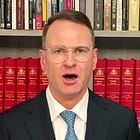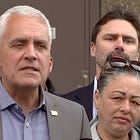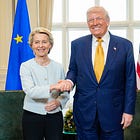Putin Using Peace Talks to Buy Time as European Leaders Rally Behind Zelensky
Today’s email is brought to you by Empower your podcasting vision with a suite of creative solutions at your fingertips.
Russian President Vladimir Putin is using ongoing peace negotiations to delay resolution of the Ukraine conflict while his forces seize additional territory, a leading defense analyst warned Monday as European leaders prepare to join President Volodymyr Zelensky for crucial talks with Donald Trump.
Matthew Sussex, a visiting fellow at Australian National University's Strategic and Defence Studies Centre, said Putin has "every incentive" to prolong negotiations rather than pursue genuine peace, describing the Russian leader's approach as designed to "kick the can down the road as long as possible."
"Putin wants to delay and kick the can down the road as long as possible," Sussex told Bloomberg's Asia Trade program. "That gives the Russian armed forces time to take more territory in Ukraine so that they can come to the negotiating table and say, look, ultimately, it is inexorable. Russia will win eventually."
The assessment comes as a high-profile delegation of European leaders prepares to attend an upcoming meeting between Trump and Zelensky at the White House, marking a significant show of unity designed to prevent Ukraine from being pressured into an unfavorable peace deal.
European Commission President Ursula von der Leyen, NATO Secretary-General Mark Rutte, British Prime Minister Keir Starmer, French President Emmanuel Macron and German opposition leader Friedrich Merz are all expected to participate in the discussions, according to Sussex.
"What they want to ensure is that Zelensky isn't ambushed like he was the last time he was in the White House," Sussex said, referring to a previous encounter where Trump and Vice President J.D. Vance reportedly called the Ukrainian president "a dictator and ungrateful for American help."
The European presence represents a strategic effort to ensure the continent maintains influence over decisions affecting its security future. Sussex emphasized that European leaders want to communicate "very much that Europe has skin in the game and that it doesn't want to see the future of European security decided without it at the table."
The current peace proposals under consideration favor Russian territorial gains and differ significantly from European and Ukrainian preferences for a graduated approach to ending hostilities. Sussex described the Russian-backed plan as "rather a sort of maximalist Russia friendly one, which involves Ukraine giving up enormous amounts of territory that it currently controls to Russia in exchange for a sort of fix of the conflict lines where they are now."
This approach conflicts with what Sussex said Ukrainians and Europeans prefer: moving toward "a sort of graduated ceasefire" rather than jumping directly to a comprehensive peace agreement without adequate security guarantees for Ukraine.
The stakes for Europe extend far beyond Ukraine's borders, with potential implications for the entire post-World War II security architecture. Sussex warned that accepting Russian territorial gains would send dangerous signals about the effectiveness of military conquest and could undermine U.S. alliance credibility globally.
"If, in fact, the Russians get their way and a peace deal is forced on Ukraine, then it first of all sends the message that conquest pays off," Sussex said. "It second sends the message that, you know, US security alliance credibility is kind of low."
The Trump administration's approach to the conflict has raised concerns among European allies about America's commitment to NATO obligations and traditional security partnerships. Sussex noted the administration "has been making noises since the Trump administration took office that it may not be as committed to upholding some of its treaty obligations than previously."
European leaders recognize they may need to assume primary responsibility for post-conflict Ukrainian security regardless of how negotiations conclude. Sussex said Europeans understand "they're going to probably have to take the lead anyway in securing a post-conflict Ukraine."
Despite Trump's stated desire to end the conflict quickly, domestic political pressures in the United States may actually favor continued Ukrainian support. Sussex cited polling showing strong Republican backing for Ukraine assistance, with "fully 84% of them support more assistance for Ukraine and don't believe that Vladimir Putin is someone whose word should be trusted."
However, Trump's control over the Republican base and Congress limits the practical impact of this popular sentiment. "The way that he controls the base, the Republican base, as well as Congress and the Senate, means that I think there's very little pressure on him," Sussex said.
For Ukraine, the prospect of accepting territorial concessions remains deeply problematic both strategically and domestically. Sussex noted the proposed Russian terms would require Ukraine to "cede large amounts of land, where they have coal, mineral deposits, and give that to the Russians" while fighting for "their homeland."
Truth matters. Quality journalism costs.
Your subscription to Mencari directly funds the investigative reporting our democracy needs. For less than a coffee per week, you enable our journalists to uncover stories that powerful interests would rather keep hidden. There is no corporate influence involved. No compromises. Just honest journalism when we need it most.
Not ready to be paid subscribe, but appreciate the newsletter ? Grab us a beer or snag the exclusive ad spot at the top of next week's newsletter.
Ukrainian domestic opinion remains divided, with some pressure on Zelensky to end the conflict but "just as many Ukrainians who want to fight on and would be absolutely outraged with the prospect that Zelensky could trade large swathes of Ukraine to Russia."
Russian domestic politics provide little pressure for peace, according to Sussex. While "there's a general war weariness" among the Russian population, the conflict "hasn't really touched the types of places with real political influence in Russia" - meaning Moscow and St. Petersburg.
The threat of severe penalties for anti-war protests further limits domestic pressure on Putin. Sussex noted Russians risk "up to 15 years in jail simply" for protesting against the war, reducing incentives for public opposition.
Potential international pressure from China and India appears limited, despite both countries' economic relationships with Russia. Sussex suggested India feels "pretty aggrieved at the way it's been treated by the Trump administration" after decades of careful diplomatic cultivation by previous U.S. governments.
While India purchases significant amounts of Russian arms and energy, "its amount of leverage over Putin is kind of limited," Sussex said. He suggested New Delhi calculates that Trump "is probably not prepared to go to 500% tariffs in order to basically force India to buy American energy rather than Russian energy."
China's position appears even more detached from genuine peace efforts. Sussex argued that Chinese President Xi Jinping "probably wins whatever happens and has an incentive, really, to see Russia as on the front foot, but nonetheless weakening itself" while keeping "the United States distracted and Europe distracted as well."
The Trump administration has indicated willingness to delay additional sanctions and tariffs while negotiations continue. Trump recently announced he would "hold off on raising tariffs on Chinese goods for buying Russian oil, given the progress with President Putin."
The upcoming White House meeting represents a critical moment for determining whether international pressure can produce meaningful progress toward ending the conflict or whether Putin's strategy of using negotiations to buy time while advancing militarily will continue to prevail.
For European leaders, the stakes extend beyond Ukraine to the fundamental question of whether the transatlantic alliance can maintain its traditional role in guaranteeing continental security in an era of American strategic uncertainty.
Got a News Tip?
Contact our editor via Proton Mail encrypted, X Direct Message, LinkedIn, or email. You can securely message him on Signal by using his username, Miko Santos.
Sustaining Mencari Requires Your Support
Independent journalism costs money. Help us continue delivering in-depth investigations and unfiltered commentary on the world's real stories. Your financial contribution enables thorough investigative work and thoughtful analysis, all supported by a dedicated community committed to accuracy and transparency.
Subscribe today to unlock our full archive of investigative reporting and fearless analysis. Subscribing to independent media outlets represents more than just information consumption—it embodies a commitment to factual reporting.
As well as knowing you’re keeping Mencari (Australia) alive, you’ll also get:
Get breaking news AS IT HAPPENS - Gain instant access to our real-time coverage and analysis when major stories break, keeping you ahead of the curve
Unlock our COMPLETE content library - Enjoy unlimited access to every newsletter, podcast episode, and exclusive archive—all seamlessly available in your favorite podcast apps.
Join the conversation that matters - Be part of our vibrant community with full commenting privileges on all content, directly supporting The Evening Post (Australia)
Catch up on some of Mencari’s recent stories:
It only takes a minute to help us investigate fearlessly and expose lies and wrongdoing to hold power accountable. Thanks!








